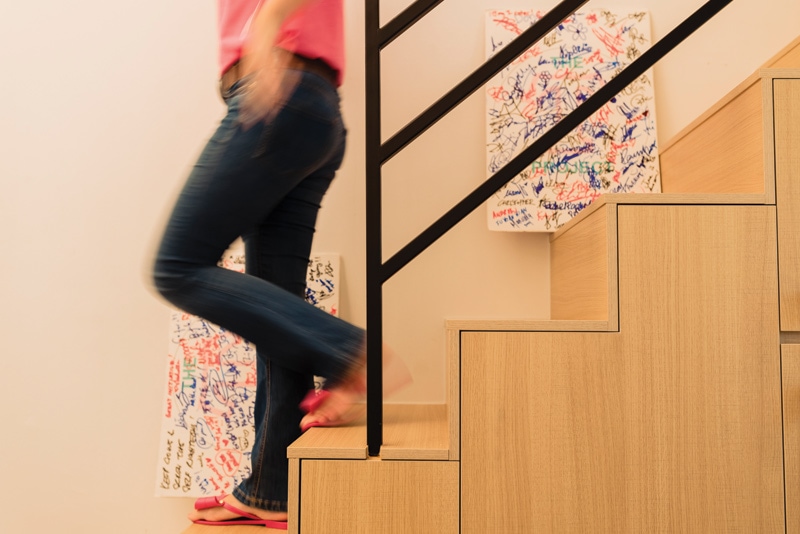June Chua: The Accidental Activist
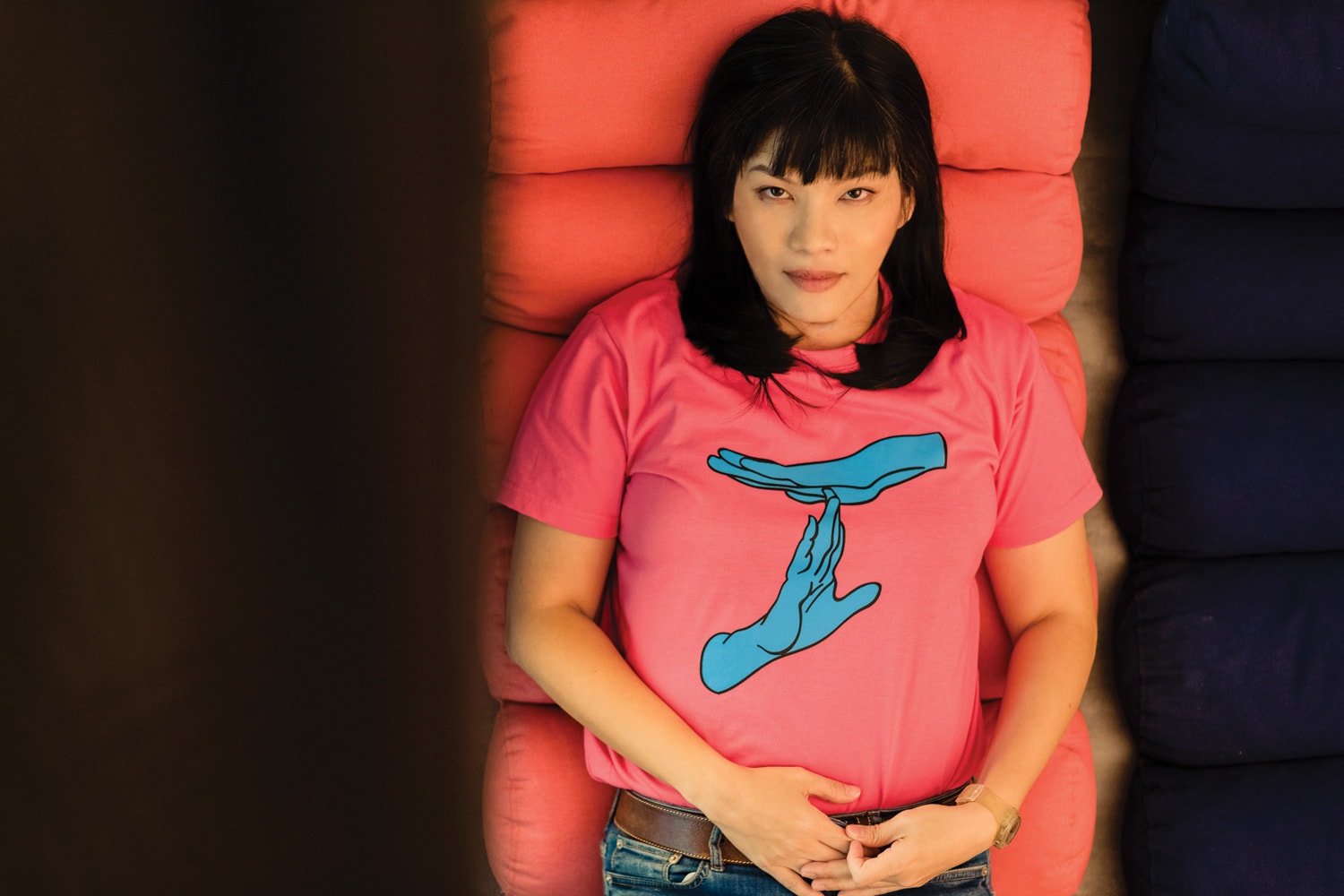
Although June Chua would hate to admit it or perhaps be in the dark about its veracity, she has slowly re-written the rules of activism. Here is a transgender woman fighting arduously against the system, the government, and society's occasional acerbic judgement of transgender people by reclaiming their position as ‘agents of change’ in the LGBTQ community. In the past 4 years, her work as the co-founder of The T Project has been palmary—spanning the gamut from opening Singapore's first and only transgender shelter in Geylang to changing and re-shaping public perceptions and attitudes toward the transgender community. There is only one word to describe the impact that The T Project has on the transgender community in Singapore: transformative. Over the years, they have built up a network of referral support that helps residents with their employment, social, healthcare, and emotional needs. To date, it remains the sole social service programme in Singapore that caters not only to the female transgender community, but also to transgender people living with HIV. I am scheduled to meet June at the newly-renovated Alicia Community Centre at Pelikat@Promenade; a drop-in shelter for the LGBTQ community and transgender youth. It is in this sleepy, suburban neighbourhood of Kovan that June has chosen to locate the shelter, named after her late sister who, like June, was also transgender and an advocate for transgender rights. As I push open the glass door with a sticker of the transgender flag (blue, pink, and white), I am greeted by the glow of warm lights and the sound of whispered murmurings. My arrival remains unnoticed and for a fleeting moment, I have the rare privilege of observing June in her natural habitat—not as an LGBT panellist or speaker, but as an unassuming leader who casually peruses the cost of customised cupcakes for the upcoming launch party of the Alicia Community Centre. Dressed simply in jeans and a bright pink T-shirt emblazoned with the graphic of two hands that perpendicularly form the letter “T”, June promptly invites me up to her makeshift loft office and apologises for the messy state as she's still in the midst of unpacking. After taking a sip of coffee, she launches into a quick-fire question and answer about the magazine I'm writing for, and the format of today's interview—all the while peppering her sentences with self-deprecating jokes and anecdotes.
ZAT ASTHA: How do you describe what you do to someone you’re meeting for the first time?
JUNE CHUA: First, I always tell them I’m an out and proud transgender woman. Then I say I was a sex worker, and I know that will hook them in because they expect a titillating story. Only when I have their fullest attention do I finally tell them that I’m the co-founder of The T Project, a shelter for the homeless transgender community. For me, I tend not to talk about my personal journey, the procedures I’ve been through, my hormone therapy, or how my family came to accept me especially as a transgender female and as a sex worker too. I’d honestly rather talk about the challenges transgender people face in life: How do we overcome these challenges and why are we unable to overcome so many of them? There’s also a lack of support. In fact, there's zero support from Singapore for the T community. That’s what I like to talk about.
ZAT: Are you still doing sex work?
JUNE: Are we going to talk a lot about my sex work? I notice that whenever I’m at a panel or with an audience and I say I was a sex worker, the lights in their eyes dim. Then they start asking all these weird questions like how much do I charge my customers or who are my customers. I think that’s why I stopped introducing myself as a former sex worker and instead start by telling people about the work that I do at The T Project. Only when it’s necessary for the story, do I tell them about my past.
ZAT: Why do you think people are so interested in the physical transformative aspects of being a transgender?
JUNE: I think it’s curiosity. But it’s very offensive to me. When you meet people for the first time, you won’t ask if they’re circumcised. It’s the same. People who meet me for the first time shouldn’t be asking about my sex change, my operation or if my hormone pills were successful. You cannot ask such personal questions. The only reason they ask is that they don’t see me as a person—and they don’t respect me. If right from the start, they make it abundantly clear that they need to ask me those questions and are deeply apologetic about it, then, of course, I will share.
ZAT: What is the origin story of The T Project?
JUNE: In 2014, I was invited to an Interfaith Conference organised by CDC (Community Development Council). A CEO of a non-profit organisation was there and she heard what I shared. After the event, she emailed me saying that she’s looking to set up a shelter for marginalised women and was willing to share the space with me. At that time, I couldn’t tell people who the organisation was because the people funding that shelter only wanted to fund a particular type of marginalised woman, and weren’t so keen on a transgender woman. It’s mind-boggling, isn’t it? So, I found a location and helped them set up the shelter. I used the attic as a shelter for my own transgender community. That’s how T Project started. Through conversations.
ZAT: What was your childhood like growing up?
JUNE: Very happy, lor. That’s what I always tell people. I don’t have the common story of the struggle of growing up gay or ‘ah gua’ because I was so in tune with my sexuality and I totally embraced it. I don’t know why or how either. How I discovered I was a transgender woman was when I was in school and the Malay boys called me ‘bapok’ (a Malay word for transvestite). When I discovered what it meant, I made it my mission in life to be a ‘bapok’. I still stayed in school though. I never left.
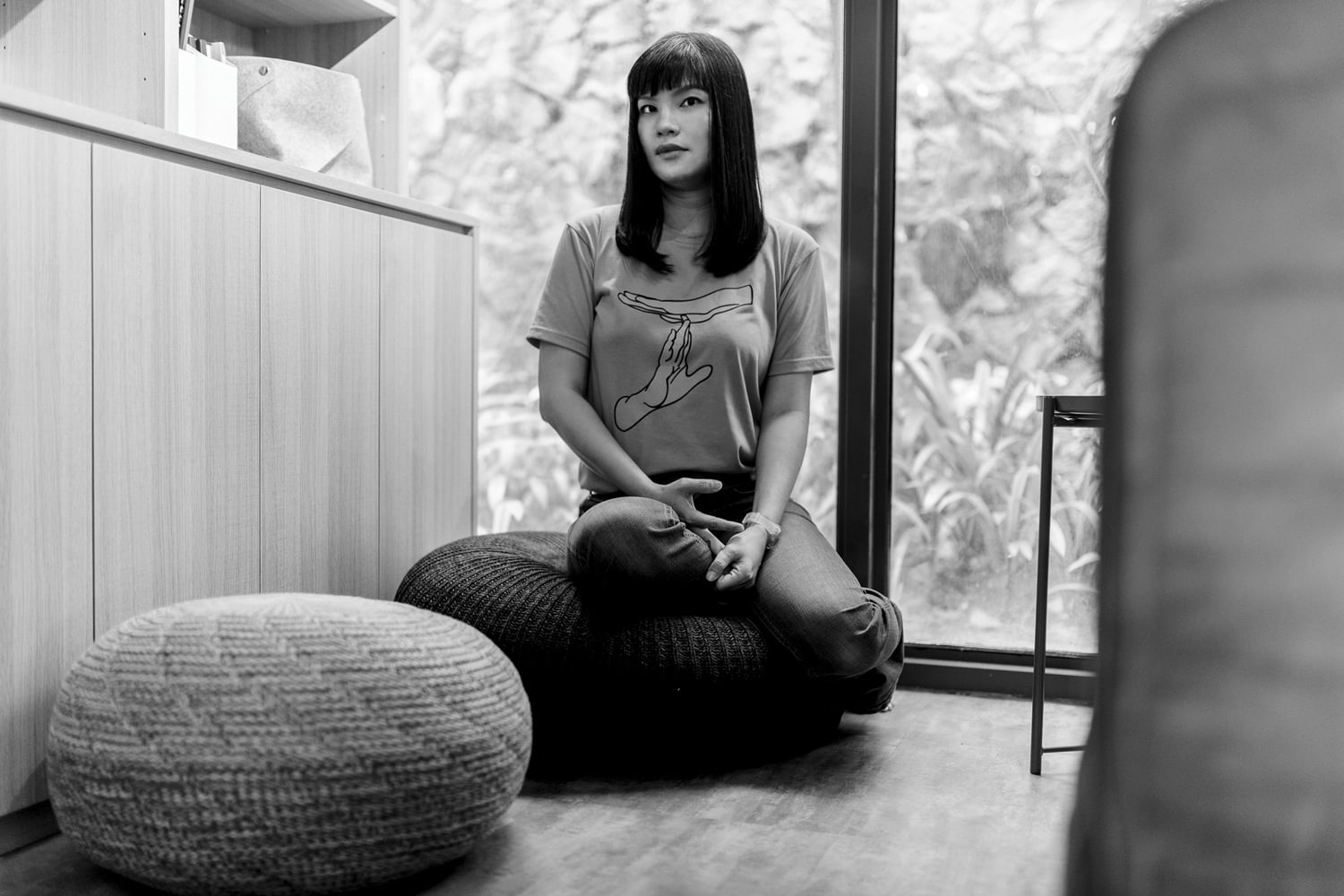
ZAT: What was life like for a transgender student in the 80s?
JUNE: I like to tell people that I was the only girl in Bartley Boys Secondary School and my preferred name was Ginger. My friends and teachers called me Ginger, in fact, the whole school called me Ginger. They didn’t know it at that time, but they affirmed me. [laughs]
ZAT: You seem to have a very smooth sailing childhood.
JUNE: It was never difficult for me. Of course, I know stories of people being bullied—and it’s very real. But back then, when I decided to be a transgender, my veneer was not that of being timid or scared because I really, truly believed that I was a girl. All the boys knew. Nobody asked me why I wanted to be that way because they knew that I am a girl. So, I was never bullied. I was once sent to the Discipline Master because of the way I behaved. When he asked me if I felt like a woman trapped in a man’s body, I screamed: How you know! Because that was exactly how I felt inside. It was such a euphoric moment that I think I blacked out immediately. Till this day, I cannot remember what happened after I screamed.
ZAT: How about your parents? Were they as accepting?
JUNE: My parents accepted me because I’m still their child. It’s the love they have for their children. They accepted me as a sex worker because they saw how it gave me financial stability and how it made me the independent woman that I am today. I think my father was simply contented with the fact that I never took drugs, I never borrowed money, and I never inconvenienced anyone. Maybe it was a way for him to justify that I’m worthy. I don’t really know.
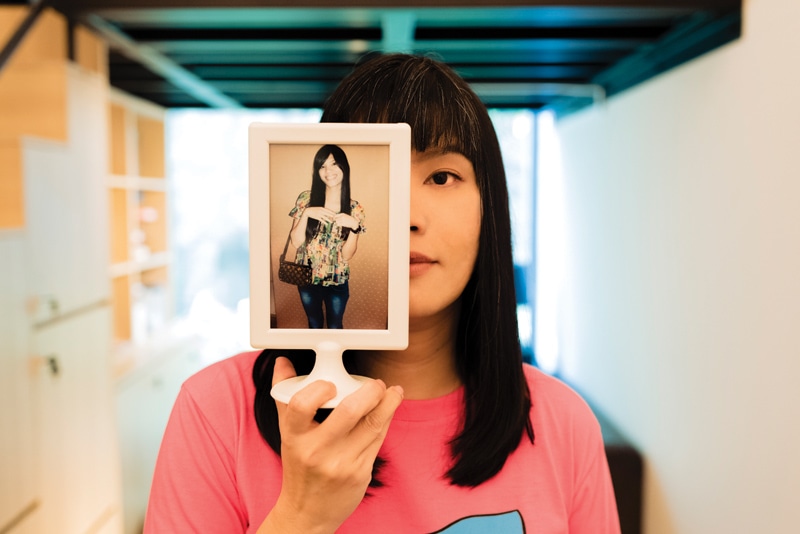
One person, two names.
On the left, Karen.
On the right, June.
ZAT: What was your working name when you used to be a sex worker?
JUNE: I called myself Ginger. My work name is Karen. My NRIC name is June. My auntie sometimes calls me Andrew. And my mother calls me Ah Seng, because no matter who I am, I am still her Ah Seng. If my mother allows me to be who I am, I will allow her to call me however she wants. It’s only fair.
ZAT: What was your religious or spiritual upbringing like?
JUNE: I don’t have any. I believe in karma. I believe if you do good, good things happen to you. Even if you hold opposing views to me, I will let you talk. But it’s up to me whether I choose to listen. You can talk but if I refuse to listen, it’s as if you’ve never uttered a single word. Who are you to tell me how to live or what to believe? This is my life. I can do whatever I want with it. Similarly, you can feel however you want. You can go and find like-minded individuals and I will find mine.
ZAT: If you could change anything about the way you were raised, what would it be?
JUNE: I wouldn’t change a single thing. I don’t dare to say that I have no regrets. But now, I live my life with as little regret as possible. People always say, “YOLO”.
ZAT: Tell me about your sister, Alicia.
JUNE: Alicia was also transgender. She passed away suddenly in 2015. I come from a family of five: my parents, sister, brother (who is straight and very fertile), and I. My brother said that the reason why he’s always having children is to make up for the fact that my sister and I won’t be able to give my parents grandchildren [laughs]. I always remember what Alicia told me till today: ‘Because we are blessed, we must give more.’ I always wondered why she was so nice to the people around her especially when sometimes it can be quite burdensome. She was very genuine about helping others and always never expected anything in return at all. I opened this Community Centre as a tribute to her on the third anniversary of her passing.
ZAT: What was your fondest memory of her?
JUNE: I don’t have a last or fondest memory of her, because every single memory I have with her was the fondest. I treasure every single one because she’s not here with me anymore.
ZAT: As a transgender, the issue surrounding the repeal of Section 377A doesn’t really affect your community. Why are you still so supportive of the movement?
JUNE: Doing LGBT work is very tiring. That’s why with The T Project, I try to provide the most basic needs first: housing, jobs, and food before we talk about other broader issues. The repeal of 377A doesn’t affect me because my gender marker has changed. Even if I have sex with 10,000 men, it’s not a criminal act. But of course, I see the LGBTQ community as my fellow brothers and sisters. I’m very mindful that If I don’t support such movements involving the LGBTQ Community, one day if I need their support, they won’t be around. It’s like that poem by Martin Niemöller:
First, they came for the socialists, and I did not speak out—
Because I was not a socialist.
Then they came for the trade unionists, and I did not speak out—
Because I was not a trade unionist.
Then they came for the Jews, and I did not speak out—
Because I was not a Jew.
Then they came for me—and there was no one left to speak for me.
Whenever there are social rights movements such as the repeal of 377A, I will always find a way to see how I can support them. I am aware that although the issue doesn’t personally affect me, it still affects the people in my community who don’t want to have a gender marker change. So I find ways to be supportive. I always try to find an ‘in’.
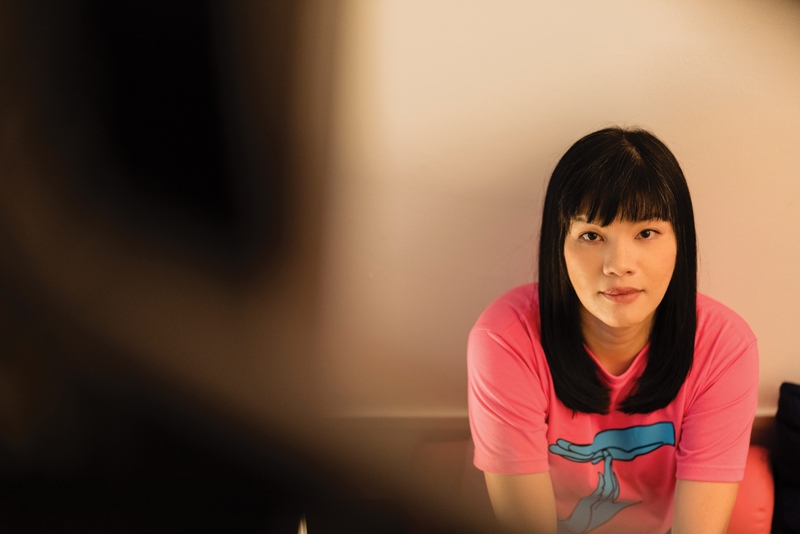
ZAT: What does family mean to you?
JUNE: The motto for Alicia Community Centre is ‘Uniting the Families’. Everything I do here is always about family. We are so fragmented. Even within the community, we judge each other. In a narrow sense, it means uniting the trans men and trans women, but it also means uniting the LGBTQ community as a whole—and as a family. My volunteer, Shan, told me that throughout history, we (the transgender community) were always the agents of change. But somehow along the way, we were forgotten. So I hope with all the work that I do under The T Project, I can reclaim back… no, we can reclaim back our position within the family. But I will leave it to the individual to define what family is.
ZAT: What was the hardest thing you had to overcome in the few months leading up to the opening of the first transgender shelter in Geylang?
JUNE: There were no difficult moments that I can remember. We managed to raise $136,000. The minute I had the money, the next day, I found the shelter. I knew I wanted it to be in Geylang; I wanted it to be a safe space. The most memorable moment was when the first resident moved in. Her name was Christine, but she has since moved out. We successfully helped her get a rental flat with HDB. Honestly, there’s really nothing too difficult that I cannot solve.
ZAT: Are you surprised by the level of support for the shelter in Geylang?
JUNE: Of course. I really, really feel very blessed. Many stepped up to provide furniture, donate kitchenware, and electrical items. It’s the same for the Alicia Community Centre. I’ve had people gifting me IKEA vouchers, and sometimes I tell people this place looks like an IKEA showroom. [laughs] I still don’t know why I’m so blessed. I don’t think it’s because I’m funny, or charming, or anything like that. I think it’s because people see the work I do. I always tell people to let your work speak for itself. You don’t have to say much—let your work do all the talking for you. You can be the most obnoxious person or the worst orator, but you must remember that your backers and supporters are not funding you; they’re funding your work.
ZAT: What’s the worst thing people have said about The T Project?
JUNE: I can’t recollect. Or at least I don’t really want to give the power to people who say bad things about The T Project by repeating it. If I repeat it, it’s like picking up food from the floor someone has left behind and eating it. I just want to do my work. If they say good things, I will still continue. If they say bad things, I will also continue. The more negative things people say, the more it spurs me on to do better. On the surface, it looks like I’m not affected by their comments, but it actually kills me inside. I always turn negativity into strength and do better.
ZAT: How about the nicest thing?
JUNE: Let me tell you about this message I received when I first set up the shelter. Someone said, “June, the community always talks about opening a centre to unite everybody. But you actually did it.” I never imagined doing this and going this far. I always thought that I would marry a rich man, win the lottery, and live happily ever after. [laughs] I feel like I’m born to do something... more, you know? It’s always been at the back of my mind. When I was 28, I asked myself if I was going to continue doing sex work and use my money to buy a limited edition Louis Vuitton bag or if I was meant to do something more? I suppose The T Project is that something more.
ZAT: What is the biggest misconception people have about you?
JUNE: I know it’s very cliché, but I really don’t like it when people say I’m selfless for doing all these things because the truth is, I’m paid. I just really enjoy doing what I’m doing now. Don’t say I’m selfless or noble—it’s not like I sold my flat to fund everything. I know others who have done greater things than I have. They are selfless. I’m just happy to be doing what I can do for my community. There was a gap and I happen to be able to fill it.
ZAT: When I tell people I’m interviewing you, the first thing they remember is how funny you are. Have you always been this funny?
JUNE: I really don’t take myself too seriously. Sometimes when I’m at a panel, it gets too dry and boring, so being funny is a way to wake myself and the crowd up. I don’t know if it’s a defence mechanism though. I’ve just always been like this even with my friends. But, I only dare make jokes about myself. That’s why you notice, all the jokes have always been about me. With community work, there is so much pressure and stress, and if you can’t laugh at yourself, I don’t know how anyone can survive.
ZAT: What’s your life's greatest accomplishment?
JUNE: That I embraced my gender identity totally and completely. I own my emotions. I can laugh and cry at anything and almost everything. I’ve never felt lesser than anybody else. I can even laugh about my late sister; I’ve never felt like she’s gone, you know? Yes, her physical body is gone, but I still feel her presence and aura around me. I always wonder: Do you really need your loved one physically around to enjoy their company? Part of what I do here is also part of her. I remember a quote from the movie, The Equaliser 2: “If you don’t talk about your loved ones who have passed every day, they die a second time.” This centre is a shrine to her.
ZAT: When you look at the state of the world, what gives you hope?
JUNE: I guess now that there’s a shelter for the homeless transgender community and a drop-in shelter for the transgender youth, that gives me hope. I don’t think people have really accepted the people from my community. That’s what I’m here for. I’m here to make people accept us and to push the ‘T’ into society. How it turns out or whether it would make the society more inclusive and accepting, that’s up to everyone else. I can only do what I can manage. The rest is up to all of you.
ZAT: Do you worry about your legacy?
JUNE: I don’t really care about my legacy. It’s unnecessary to think about all this. I don’t even have a successor or a five-year plan but I know that if anything were to happen to me, I am certain that someone will step up. I am very, very sure of that.
ZAT: Do you think transgender youth now are luckier than the previous generation?
JUNE: Yes. I’m so jealous of them. I know so many transgender youth studying in university. And they have the audacity to come up to me and say that their family doesn’t love them. So I ask them: Who’s paying for your university fees? ‘My parents, lor.’ Where are you staying? ‘Parents’ house, lah.’ And in my head, I’m thinking: You dare say your parents don’t love you, ah? During my time, I know friends who were chased out of their house when they were in Primary 3! Now, you can be who you are, you can live in the same house with your parents, and they still pay for your expensive university fees. You better go home and kowtow to them. They’re so lucky. I’m really, really envious of them.
ZAT: What’s the most recent life lesson you’ve learned that has changed the way you look at the world today?
JUNE: When I first started activism work, I was very self-conscious of my past as a sex worker. I had self-doubts about my capabilities. So I used to listen to what people told me to do because they were experts in their field. But slowly I've come to realise that I should follow my instincts and intuition because I know my community best. Now, I am more assertive with the things I do. If following my instincts fail me, then I accept it as my mistake. Even until now, I am very afraid of making the wrong decisions for others. I would always ask myself so many questions regarding the Community Centre and the shelter in Geylang: Do I have enough money for the shelter? Should I open the community centre here? Is this location the best? But the more I think about it, the less I do. Eventually, I don’t care. I just do it. If I don’t, then all these things won’t materialise. I learned to believe in myself more.
ZAT: Finally, who is your ideal man?
JUNE: My ideal man is a person. Because the organ doesn’t define you. If I love you, but you don’t have a penis, so be it lor. It still doesn’t matter to me. I don’t focus on the organ, but more on the personality. But personally, I am such a difficult person to be with lah. I suppose if I had to choose, it would be someone who can accept all my flaws like farting in bed, staying at home for three days, and listening to me talk non-stop especially when I just had coffee [laughs].
***
Edited by Wy-Lene Yap
